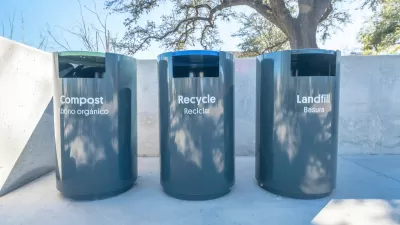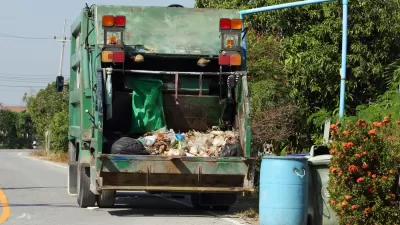Because city residents generate four times as much trash as rural residents, the rapid growth of the world's cities is leading to the rapid growth of the world's garbage. A new study examines future trash troubles and potential solutions.
"Global waste has bulged 10-fold in the last century," notes Ben Schiller. "And by 2025, it's set to double from where it is today, according to a study in the journal Nature. The chief reason: newly rich cities of the developing world."
"'As a country becomes richer, the composition of its waste changes. With more money comes more packaging, imports, electronic waste, and broken toys and appliances,' says the article by Daniel Hoornweg, Perinaz Bhada-Tata and Chris Kennedy. In turn, that leads to environmental problems, like toxic leakages from landfills, and plastic clogging oceans and rivers."
How can we slow, and eventually stop, the growth of the world's waste? "They recommend the rest of the world take a cue from San Francisco's book (it has a zero-waste policy), and introduce disposal fees that put a price on waste generation," explains Schiller. "'Increased education, equality, and targeted economic development' could cut population growth, limiting waste naturally, they add."
FULL STORY: By 2100, We'll Be Living In A World Of Garbage

Planetizen Federal Action Tracker
A weekly monitor of how Trump’s orders and actions are impacting planners and planning in America.

Congressman Proposes Bill to Rename DC Metro “Trump Train”
The Make Autorail Great Again Act would withhold federal funding to the system until the Washington Metropolitan Area Transit Authority (WMATA), rebrands as the Washington Metropolitan Authority for Greater Access (WMAGA).

DARTSpace Platform Streamlines Dallas TOD Application Process
The Dallas transit agency hopes a shorter permitting timeline will boost transit-oriented development around rail stations.

Renters Now Outnumber Homeowners in Over 200 US Suburbs
High housing costs in city centers and the new-found flexibility offered by remote work are pushing more renters to suburban areas.

The Tiny, Adorable $7,000 Car Turning Japan Onto EVs
The single seat Mibot charges from a regular plug as quickly as an iPad, and is about half the price of an average EV.

Supreme Court Ruling in Pipeline Case Guts Federal Environmental Law
The decision limits the scope of a federal law that mandates extensive environmental impact reviews of energy, infrastructure, and transportation projects.
Urban Design for Planners 1: Software Tools
This six-course series explores essential urban design concepts using open source software and equips planners with the tools they need to participate fully in the urban design process.
Planning for Universal Design
Learn the tools for implementing Universal Design in planning regulations.
Municipality of Princeton
Roanoke Valley-Alleghany Regional Commission
City of Mt Shasta
City of Camden Redevelopment Agency
City of Astoria
Transportation Research & Education Center (TREC) at Portland State University
US High Speed Rail Association
City of Camden Redevelopment Agency
Municipality of Princeton (NJ)




























